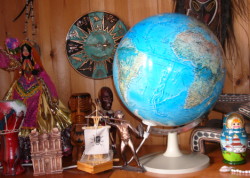
Photo. For illustration.
To boost the growing of industrialism there were need for new resources and supplies. Captain James Cook extended the Age of Exploration with his expeditions and discoveries in the late 1700 century.
It must have been interesting to join expeditions at that time to encounter people for first time and explore unknown lands. Some of the most famous explorers of the period were Christopher Columbus, Vasco da Gama, Pedro Álvares Cabral, John Cabot, Yermak, Juan Ponce de León, Ferdinand Magellan, Willem Barentsz, Abel Tasman, and Willem Jansz. Today an increasing number of people travel around the world searching for unique adventures at well known places.
It took a time before the Arctic and Antarctic seas become explored, and it was not until the nineteenth century explorations started.
Nothing will be like the early 15th century and 17th century. The world has become small because so much have been explored, but there is still opportunities for great explorations and discoveries today. So if we can take advantage of tour science, hese to explore eastwards.
Some of the recent discoveries are:
Unknown animals below The Great Barrier Reef in Australia
Inca ruins from Inca settlement similar as in Peru
What will be next?
Remains of the Yeti, the lost city Atlantis, the Holy Grail, more unknown tribes in the Amazon, Papua New Guinea, West Papua - Iran Jaya, and Central Africa,
Not all discoveries will be available for people, but some will. How will discoveries in the future affects tourism?
Sources for expeditions and discoveries:
National Geographic: www.NationalGeographic.com
ExplorersWeb:
Unusual journeys, explorers and discoveries have always fascinated people. There is always a dream about find something new.
Stein Morten Lund, 14 March 2006 (updated 15th November 2011).












